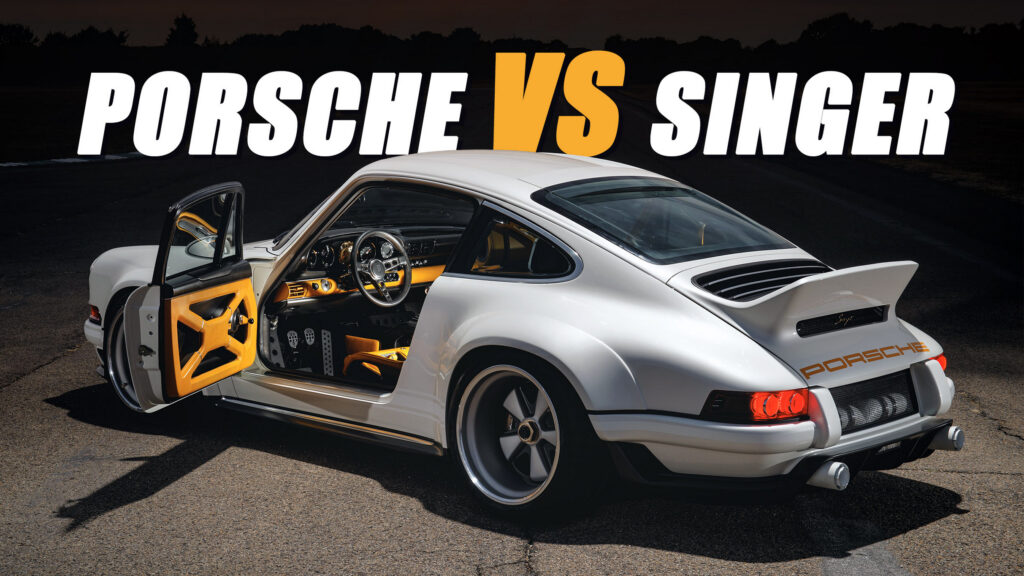- Singer’s heavily modified Porsche restorations caused a legal spat with Porsche in 2024.
- The core issue was whether Singer’s creations, particularly the DLS and DLS Turbo, still resembled enough of a Porsche to use Porsche branding.
- The lawsuit was settled with undisclosed terms, but Singer can continue building DLS models and likely has a revised agreement with Porsche.
Singer’s reimagined 911s have raised restomodding to a new art form, spawned a legion of imitators and even won high-profile fans at Porsche HQ. But how far can you modify a 911 before it ceases to be a 911? That was the crux of a new and recently-settled legal spat in 2024 between Porsche and Singer, which could potentially have implications for other aftermarket builders, and whose details we’re exclusively revealing for the first time.
Just over three years ago we broke the story of how Porsche had objected to Singer’s use of its branding on the spectacular ACS (All-Terrain Competition Study), one of a pair of radical rally-style 964s commissioned by a Singer client. The ACS featured ‘Porsche’ lettering on the engine cover and also had the German automaker’s name embossed into the carbon sill panels, but Singer was forced to remove images of the car from its website until it was able to photograph it minus the Porsche branding.
Related: Porsche Not Happy With Singer Design’s ACS, Car Pulled Off Website
Porsche was concerned that people might think that it had some involvement in the ACS project, which it didn’t, or endorsed it in some way. And the situation was made more awkward by the fact that at the time the ACS was unveiled, Porsche was developing its own rally-style 911, the far less epic-looking 911 Dakar.
New Lawsuit In 2024
So when a few fan forums recently picked up the news that Porsche had filed a complaint – the first step in a lawsuit – against Singer in February of this year, and then settled the dispute by the following month, most people assumed that the case was about the ACS. But we gained access to court documents that reveal Porsche’s beef with Singer was far more complicated.
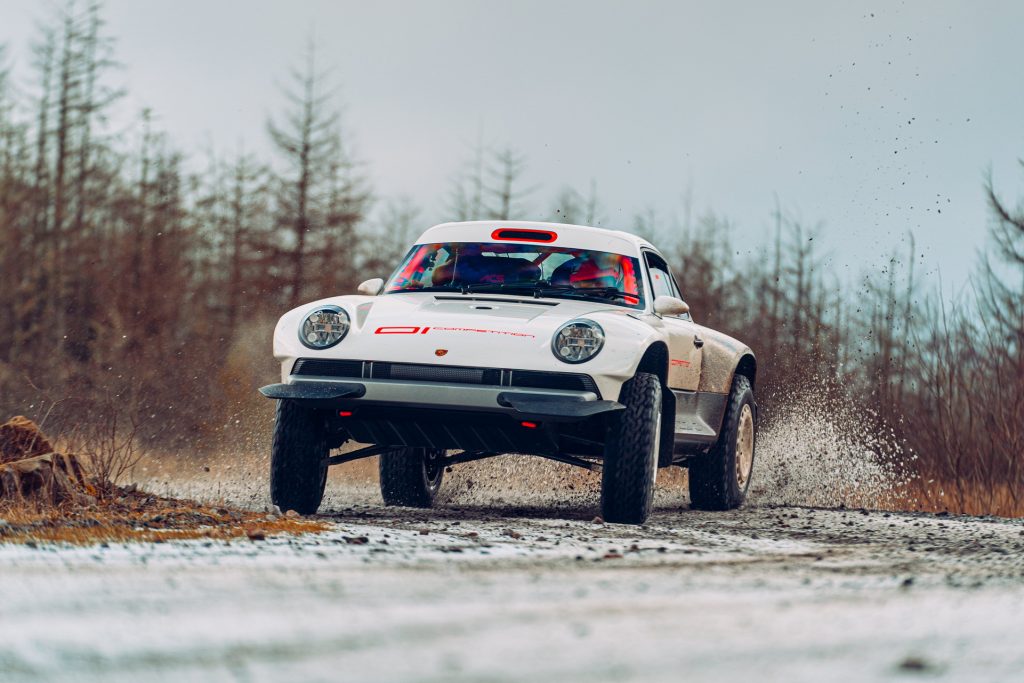
Secret agreement
Before we get into Porsche’s specific legal gripes with Singer though, we need to tell you about one fascinating revelation contained in the filing that’s key to the story. And it’s that way back in April 2012, only three years after Singer was born, Porsche was sufficiently ‘concerned’ about the impact of Singer’s business on its own that it maneuvered Singer into a ‘binding and enforceable contract’ laying out what the California-based firm could and couldn’t do if it wanted to keep Porsche’s lawyers sweet.
Frustratingly, the exact terms of that ‘Settlement Agreement’ are redacted in the latest court papers, but Porsche wrote that it ‘sets the boundaries on Singer’s use of Porsche’s famous [trade] marks.’ The gist of it seems to be that if Singer wanted to keep using Porsche branding, such as the hood badge or Porsche lettering, on its builds, the cars had to still look vaguely like Porsche road cars and retain a certain amount of Porsche engineering content, and Singer would only be allowed to restore existing cars, not build a series of new ones.
The complaint suggests that Singer happily complied with this agreement during the mid-2010s when it was taking on commissions for its Classic restorations, which featured carbon body panels, but were still, at heart, 964-generation 911s. It says there were ‘a number of incidents’ where Porsche had to remind Singer of the agreement regarding use of its intellectual property (IP), but that Singer always capitulated. Generally, then, it was happy days.
No longer a 911?
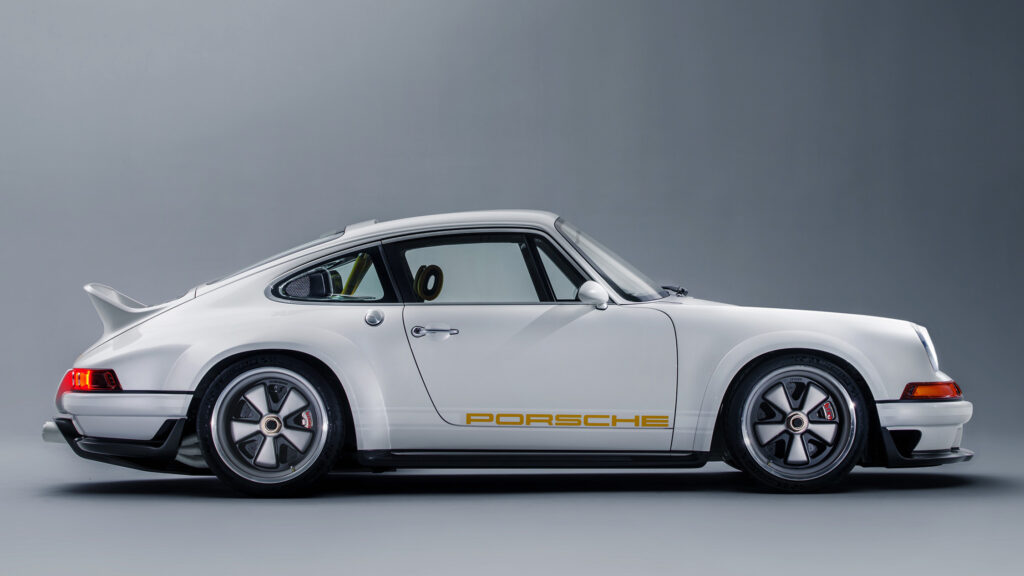
But then came the DLS, a car that drove you, me and Porsche’s legal brains wild, but for entirely different reasons. While we were getting off on the full carbon body, 9,300-rpm Williams-designed engine and entirely new suspension layout on what many people would argue is the sexiest 911 ever built, Porsche’s lawyers were looking at those same mods and reasoning that there was so little left of the original car that it no longer was a 911.
Porsche argued that the 500 hp (507 PS) DLS wasn’t only a brand new car ‘incorrectly’ wearing an existing Porsche car’s VIN, but effectively a new limited production model, and not the result of a single commission by a client. Yet when the DLS appeared at the Goodwood Festival of Speed in 2018, it was presented wearing a Porsche hood badge and Porsche lettering on the doors and tail, and they were still there when the first media drives took place and customers began receiving their cars, in 2021.
That was a problem for Porsche, and one that wouldn’t go away. Because according to the text of the legal complaint, this time Singer refused to comply with requests to remove Porsche branding from both the DLS and the 935-inspired 700 hp (710 PS) DLS Turbo that followed in 2023. Having objected to the DLS Turbo after first learning about it December 2022 (only months after agreeing to build engines for Singer’s Classic restorations), then watched the car get a rapturous reception at the Goodwood Festival of Speed the following July, Porsche’s legal team got serious, leading to this February’s official complaint.
Related: Porsche Indicates Approval Of Singer Vehicles By Signing Deal To Build Its Engines
Porsche wanted DLS production shut down
There’s a ton of repetitive legalese in the 45-page document, but Porsche’s main arguments were that by stepping outside the boundaries of the original and enforceable 2012 agreement Singer was guilty of breach of contract and was illegally using Porsche’s trademarks (its badge and name) and its ‘Trade Dress’ (the trademarked shape of the 911).
It claimed that Singer was essentially passing off its DLS models as genuine Porsche products and profiting from Porsche’s reputation, confusing buyers and ‘diluting’ the Porsche brand. And reading between the lines of the redacted parts, the DLS Turbo’s visual similarity to the 935 racer that Singer openly admits inspired it, or its dissimilarity to the road-going 911 its 964 VIN relates to, specifically broke a certain clause in the 2012 Settlement Agreement.
Having laid that all out in its legal complaint Porsche’s lawyers then turned to their demands. They requested that Singer ‘immediately terminate any further production of the DLS and DLS Turbo (all non-Turbo DLS commissions have in fact already been completed), destroy any advertisements, brochures and promo material bearing Porsche IP, and cease using Porsche’s marks.
They also asked for financial compensation made up of Singer’s profits and damages, the exact amount to be decided at trial. A trial that Porsche, with its bottomless cash reserves and armies of lawyers, could afford to drag out for months, but which an independent like Singer – even one whose cars sell for what Porsche itself described as ‘exorbitant’ prices – likely wouldn’t have the stomach for.
Potential PR nightmare
In reality, this was mostly legal posturing. We don’t doubt that Porsche was prepared to go to trial, but it would have been very keen to avoid it. Porsche is legally and morally entitled to protect its assets, and this legal complaint and threat of action was just a way of reminding Singer who calls the shots when it comes to the 911, even ones registered over 30 years ago. But there’s such goodwill for Singer in the wider automotive world that it would be a PR disaster for Porsche if it drove the company out of business. A company that only exists because of Rob Dickinson, Maz and their team’s love for Porsche and its cars.
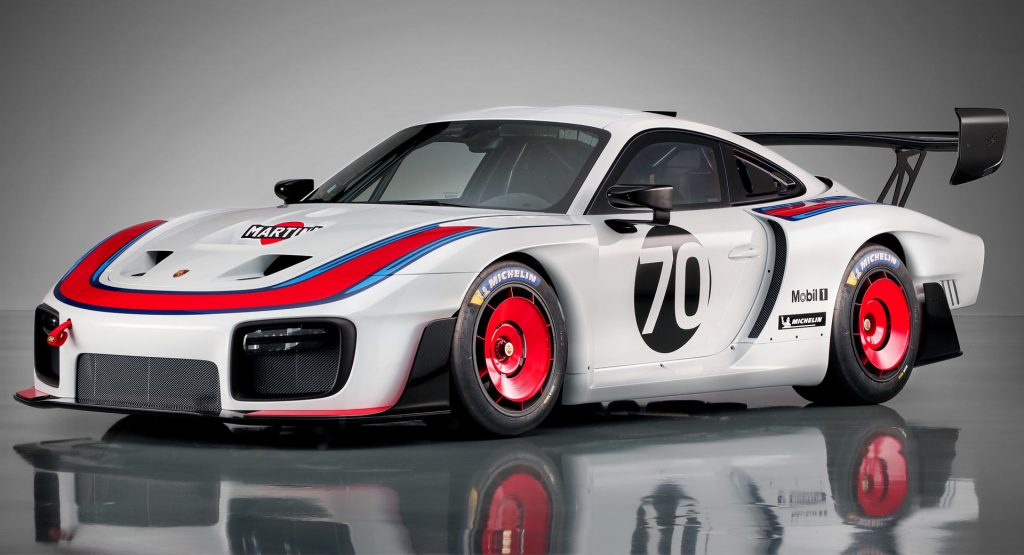
And while Porsche claims that Singer is benefiting from the reputation of the Porsche brand, it fails to acknowledge that Porsche also benefits from the reflected glory of the Singer brand. Singer might not make many cars but it generates a ton of publicity for both itself and Porsche. And Singer’s projects have almost certainly played a role in pushing Porsche to develop its own special, high-ticket, low-volume, retro cars like 2019’s $1m 935 track toy (seen above).
Crisis averted
Thankfully, there will be no trial and no cars will be hurt. Exactly what Singer and Porsche jointly agreed to settle the dispute we don’t know because the order is sealed and neither side was willing or legally able to reveal to us the terms of the final deal. Singer wouldn’t confirm or deny that it’s entered into a revised version of the 2012 contract with strict limits – though it surely has – and we don’t know if any money changed hands.
More: Theon’s First Targa Commission Gets Extra-Stiff Carbon Body And 993 RS Brakes
But we do know for sure that each of the Singer customers who paid around $2 million for a DLS can rest easy knowing that the Porsche repo man isn’t coming to take their Williams-powered carbon 911 away and drop it into a crusher. And we also know that the remaining DLS Turbo commissions will be finished as planned, and that Singer will carry on reimagining Porsche’s most iconic model.
Singer told us that it is “excited about the future” and promises it will continue to come up with knockout cars that’ll get us just as pumped as everything else it’s created over the last decade and a half. That’s great news, because the car world needs Singer, and the enthusiast-led independent firms that have followed in its footsteps.
Singer does what Porsche can’t
Much as we’d like it to, Porsche can’t and won’t build a Classic, DLS or DLS Turbo. But those are the cars that we’ll remember as the some of the defining enthusiasts cars of this era when we look back 10, 20 or 30 years from now. And every other business modifying old cars, whether Porsche-based or not, owes Singer a debt of gratitude for showing what’s possible if you let your creativity run wild, apply the latest tech to our favorite cars from yesterday and find would-be owners passionate and wealthy enough to make it all viable. Even if we know we’ll never be able to afford a Singer ourselves, we’re still glad that the cars exists.
More: Rezvani’s New Retro Sub-Brand Teases Porsche 935-Inspired Coupe
Porsche’s tough, but legally-reasonable actions might look like a smackdown, but our gut feel is that they’re just a blip in Singer’s journey. Projects like the DLS and DLS Turbo prove that the modern Singer company is now much more than a bunch of guys who modify Porsches. The way we see it, Singer’s brand is becoming so strong in its own right, and its attention to detail is now so recognized, that it could turn its focus to any make of car (or even non-automotive stuff; it already sells watches) and people would line up with credit cards ready. Hey, given the right financial backing, Singer could probably pull off making its own car. Who else would love to see that?
Journalists like me and social media posters like you can also play a role in this new era of IP respect. We all often unwittingly annoy Porsche by wrongly referring to Singer-modified cars as the ‘Singer 911’ or ‘Singer Porsche’ without thinking, and not because that’s what Singer tells us to call it. But judging from the revised footer text on Singer’s website, Porsche has asked it to clearly spell out the relationship – or lack of – between the two brands in case anyone is unclear about the matter.
“Out of respect for Porsche, and to respect Porsche’s trademark rights, this incredible machine should never under any circumstances be referred to or described as a “Singer,” “Singer 911,” “Singer Porsche 911” or a “Porsche Singer 911,” or in any other manner that suggests that it is anything but a Porsche 911 that has been restored and reimagined by Singer,” reads the blurb.
Friends again?
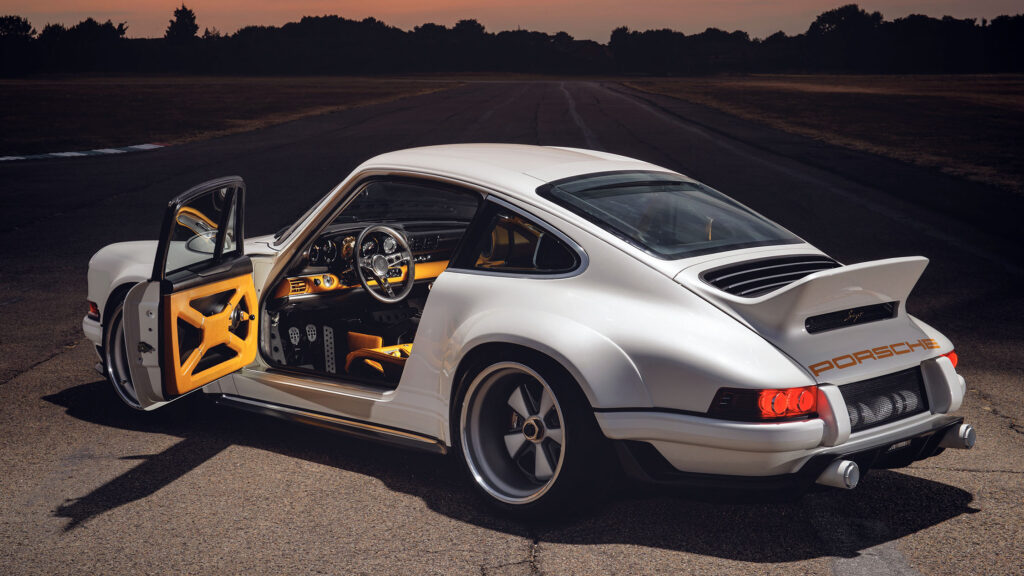
Porsche declined to discuss the case with us, saying only that ‘we have formally resolved all existing disputes.’ But here’s the statement it gave us back in 2021 when the ACS shizzle hit the air-cooling fan:
‘We are glad to have a growing community of Porsche enthusiasts. They help us to ensure that so many Porsche cars originally built decades ago remain on the road and are still being enjoyed. At the same time, we have a responsibility to our customers to ensure that Porsche products – designed and engineered by us – can be clearly and easily identified. This can range from an individual component or piece of clothing using our name through to whole cars. We do this by allowing only products created or directly licensed by us to carry the Porsche name.’
We’ve asked a few other brands involved in the high-end Porsche restomod game if the resolution of the Singer-Porsche dispute will have any ramifications for their businesses and whether they also have legal agreements in place with Porsche, but have yet to receive replies. We’ll update this story if we get a response.
Do you think Porsche was right to step in and protect its intellectual property in this case or was it being overzealous? Is it right that Porsche can control what happens to 30-year-old cars? Drop a comment below and let us know your thoughts.








